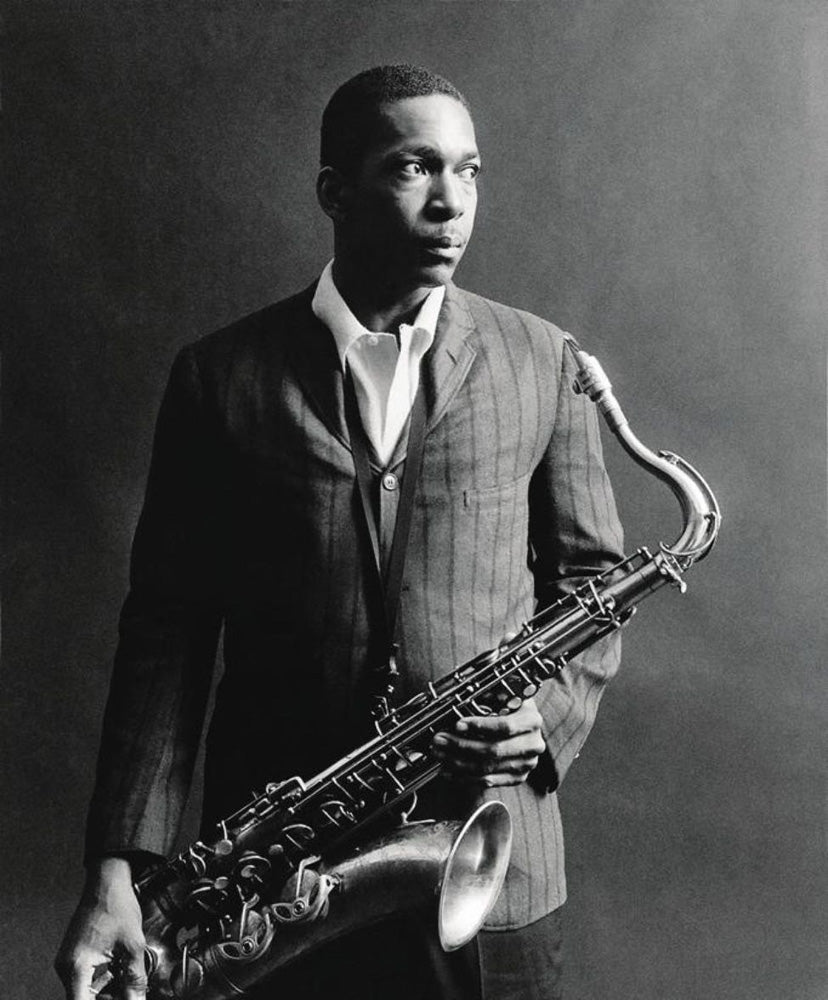John Coltrane

John Coltrane was born in 1926 in Hamlet, North Carolina. His parents were passionate about music: his mother played the piano, his father the violin and clarinet. John studied the clarinet at the age of twelve, then, inspired by the music of Johnny Hodges and Lester Young, he took up the alto saxophone.
In 1943, he moved to Philadelphia to study at the Ornstein School of Music and then at the Granoff Studios. He began performing in the city's bars in 1945, before doing his military service in the U.S. Navy Orchestra, where he played clarinet. Back in Philadelphia, he joined various rhythm & blues and jazz bands and took up tenor saxophone. He then joins Dizzy Gillespie's orchestra, a springboard that quickly allows him to collaborate with legendary artists: Miles Davis, Earl Bostic, Thelonious Monk, Charlie Parker, Sonny Rollins… These numerous encounters are an opportunity for him to experiment different universes and to enrich his playing even more. John Coltrane is not considered a genius with an innate gift; he is a hard worker eager to learn and to learn from others. He spends most of his time working on his technique and mastery of his instrument, and is distinguished by his humility, seriousness and obsessive passion for music.
In the late 1950s, John Coltrane experienced what he would call a spiritual awakening. He was particularly interested in oriental philosophies and spiritualities. A great pacifist, he aspires to contribute to positive changes in the world, to "make people happy through music". Following this revelation, he integrates a very spiritual dimension into his musical research, as shown by the titles of many works (Dear Lord, Song of Praise, Amen...).
"My music is the spiritual expression of what I am, my faith, my knowledge, my being. When you begin to measure the possibilities of music, then you want to do something that is really good for people, to help humanity free itself from its fears. I believe that music can make the world a better place and, if I can do it, I want to do it."
In 1960, he formed his own group, the John Coltrane Quartet, with whom he recorded several albums, including My Favourite Things. He also recorded an album with pianist Duke Ellington in 1962, then with singer Johnny Hartman in 1963. The following year, he released two of the most successful albums of his career: Crescent, then A Love Supreme, a mythical 33-minute work recorded in a single session.
John Coltrane died of cancer in July 1967 and is still considered one of the most influential saxophonists in history. Constantly exploring new sounds, he revolutionized jazz by developing a style of playing based on dense and fast streams of notes known as "sheets of sounds". He was also very attentive to the technical aspects and details of his instrument and its accessories; he tried out all kinds of reeds, mouthpieces and ligatures in a constant search for the perfect sound. He played a large part of his life on Selmer saxophones and adopted the Mark VI in 1960, with which he recorded A Love Supreme. The instrument, praised for its ergonomics and homogeneity of sound, offered him great flexibility and richness of sound in the bass and treble.
Photo credit: Chuck Stewart